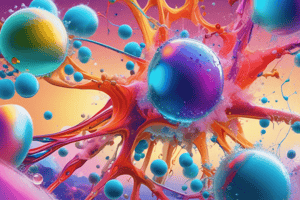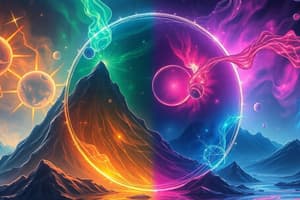Podcast
Questions and Answers
Which state of matter has a definite shape and fixed volume?
Which state of matter has a definite shape and fixed volume?
- Solids (correct)
- Plasma
- Gases
- Liquids
Which state of matter takes the shape of its container and can be poured from one container to another?
Which state of matter takes the shape of its container and can be poured from one container to another?
- Liquids (correct)
- Plasma
- Solids
- Gases
Which state of matter has a very low density and is highly compressible?
Which state of matter has a very low density and is highly compressible?
- Solids
- Gases (correct)
- Liquids
- Plasma
What is the fourth state of matter, an ionized gas that conducts electricity?
What is the fourth state of matter, an ionized gas that conducts electricity?
What do we call the transition of a substance from one state of matter to another, such as ice melting to become water?
What do we call the transition of a substance from one state of matter to another, such as ice melting to become water?
Which process releases heat when it occurs, such as freezing and condensation?
Which process releases heat when it occurs, such as freezing and condensation?
Which state of matter has a definite volume but not a definite shape?
Which state of matter has a definite volume but not a definite shape?
What do we call the process of a substance transitioning directly from a solid to a gas without passing through the liquid state?
What do we call the process of a substance transitioning directly from a solid to a gas without passing through the liquid state?
What is the term for processes that release heat when they occur, such as freezing and condensation?
What is the term for processes that release heat when they occur, such as freezing and condensation?
In which state of matter are particles ionized and can conduct electricity?
In which state of matter are particles ionized and can conduct electricity?
What do we call the property of matter that allows it to be poured from one container to another and take the shape of its container?
What do we call the property of matter that allows it to be poured from one container to another and take the shape of its container?
Which phase change occurs when a substance transitions from a gas directly to a solid without passing through the liquid state?
Which phase change occurs when a substance transitions from a gas directly to a solid without passing through the liquid state?
How many electrons does a nitrogen atom have in its neutral state?
How many electrons does a nitrogen atom have in its neutral state?
What is the total number of electrons in the chloride ion?
What is the total number of electrons in the chloride ion?
For which type of ions is the electron configuration filled up to the highest energy level?
For which type of ions is the electron configuration filled up to the highest energy level?
What is the electron configuration of the Fe 2+ ion?
What is the electron configuration of the Fe 2+ ion?
How does the electron configuration of a negatively charged ion compared to the parent atom?
How does the electron configuration of a negatively charged ion compared to the parent atom?
In which energy levels are the sublevels 2s and 2p filled for the nitrogen atom?
In which energy levels are the sublevels 2s and 2p filled for the nitrogen atom?
Flashcards are hidden until you start studying
Study Notes
- The text discusses the states of matter: solids, liquids, gases, and plasma.
- Solids have a definite shape and fixed volume. They are rigid and have a high density.
- Liquids have no definite shape but a definite volume. They take the shape of their container and can be poured from one container to another. They have a higher density than gases.
- Gases have a very low density and are highly compressible. They can flow through pipes and have a definite volume but not a definite shape.
- Phase changes occur when a substance transitions from one state of matter to another. For example, ice melts to become water when heat is added, and water boils to become steam when more heat is added.
- Solid to gas transition is called sublimation, and an example is dry ice.
- Endothermic processes are those that need heat to occur, such as melting, vaporization, and sublimation.
- Exothermic processes are those that release heat when they occur, such as freezing, condensation, and deposition.
- Plasma is the fourth state of matter, an ionized gas. It conducts electricity and is present in places like the sun and neon signs.
- To create plasma, you can add heat or electricity to a gas. When the ions and electrons recombine, they emit light and heat energy.
Studying That Suits You
Use AI to generate personalized quizzes and flashcards to suit your learning preferences.




